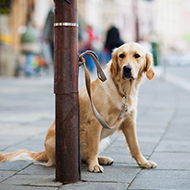Kennel Club welcomes new dog theft offence

Figures released by the Kennel Club show that 196 families every month are affected by pet theft.
The Kennel Club has welcomed the Government’s plans to introduce legislation that will make abducting dogs a criminal offence in England.
Under the new law, set out within the Animal Welfare (Kept Animals) Bill, those found guilty of dog theft could face up to five years in jail.
The move follows extensive lobbying by the Kennel Club and other animal organisations to bring about stronger sentencing and better reporting to tackle this devastating crime.
Mark Beazley, chief executive at The Kennel Club, commented: “We wholeheartedly welcome this next step from the Government, introducing a new and specific offence to tackle pet theft, and highly commend the hard and persistent work of every organisation who has been raising awareness of this issue and calling for action for many years.
“This is a win that can help to deliver justice to both the poor dogs and families victim to this devastating crime, and we hope that this amendment moves swiftly through parliament, to protect the nation’s much-loved pets.”
Dogs are currently treated in law in the same way as stolen laptops or mobile phones. This new offence, announced on Thursday (18 November), will reflect the emotional distress of pet theft and help judges hand down more targeted penalties.
In May this year, the Government formed a Pet Theft Taskforce to help tackle the surge in animal abductions resulting from the coronavirus lockdowns. Throughout its Paw and Order Campaign, the Kennel Club urged action from the Taskforce and encouraged thousands of UK dog lovers to write to their MP.
Statistics garnered as part of the campaign revealed the scale of pet theft, showing that a staggering 196 families every month are affected by the crime. The statistics also revealed that just two per cent of dog theft cases in 2020 resulted in a criminal charge.



 The Animal and Plant Health Agency (APHA) has updated its online reporting service for dead wild birds.
The Animal and Plant Health Agency (APHA) has updated its online reporting service for dead wild birds.